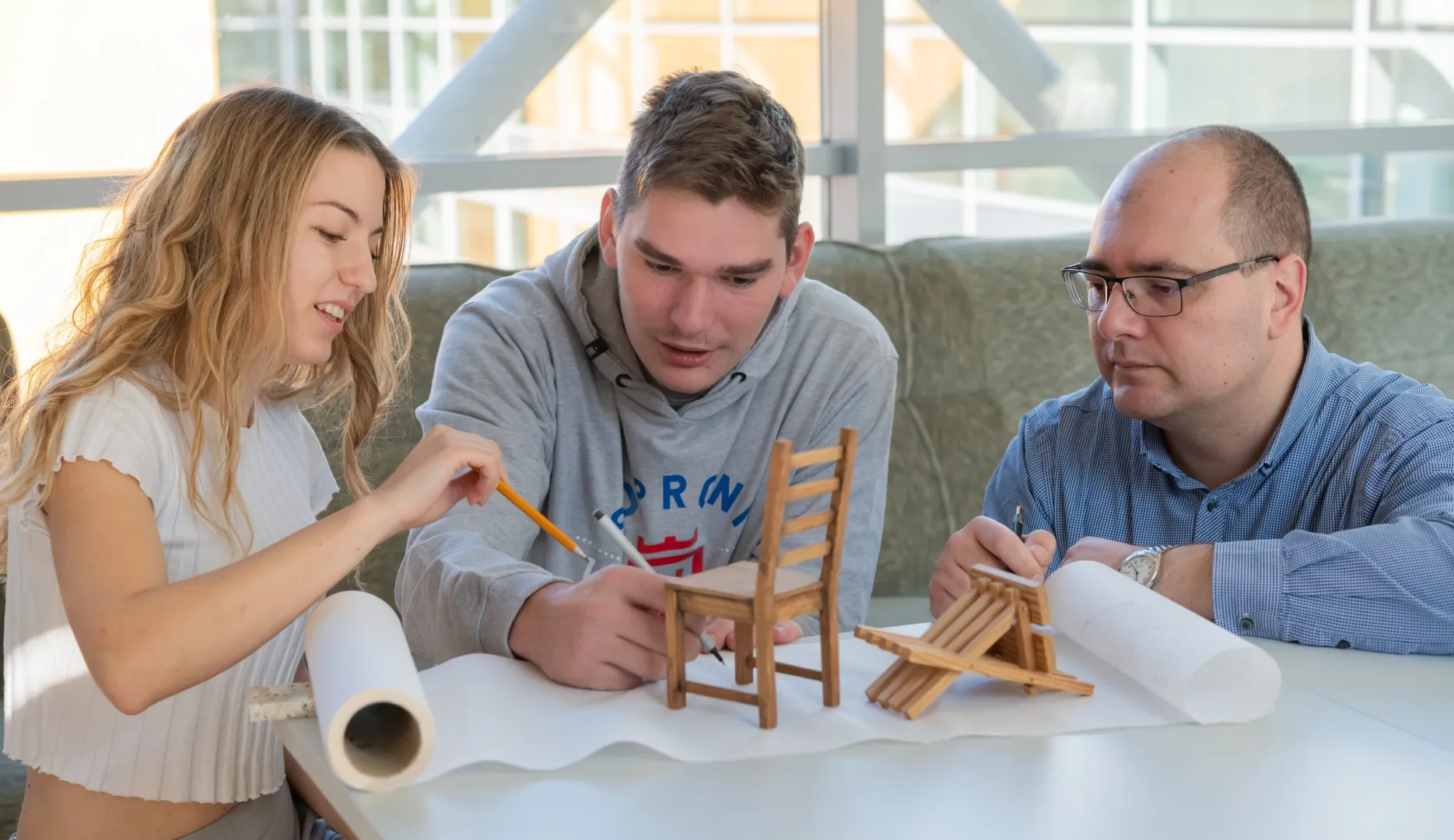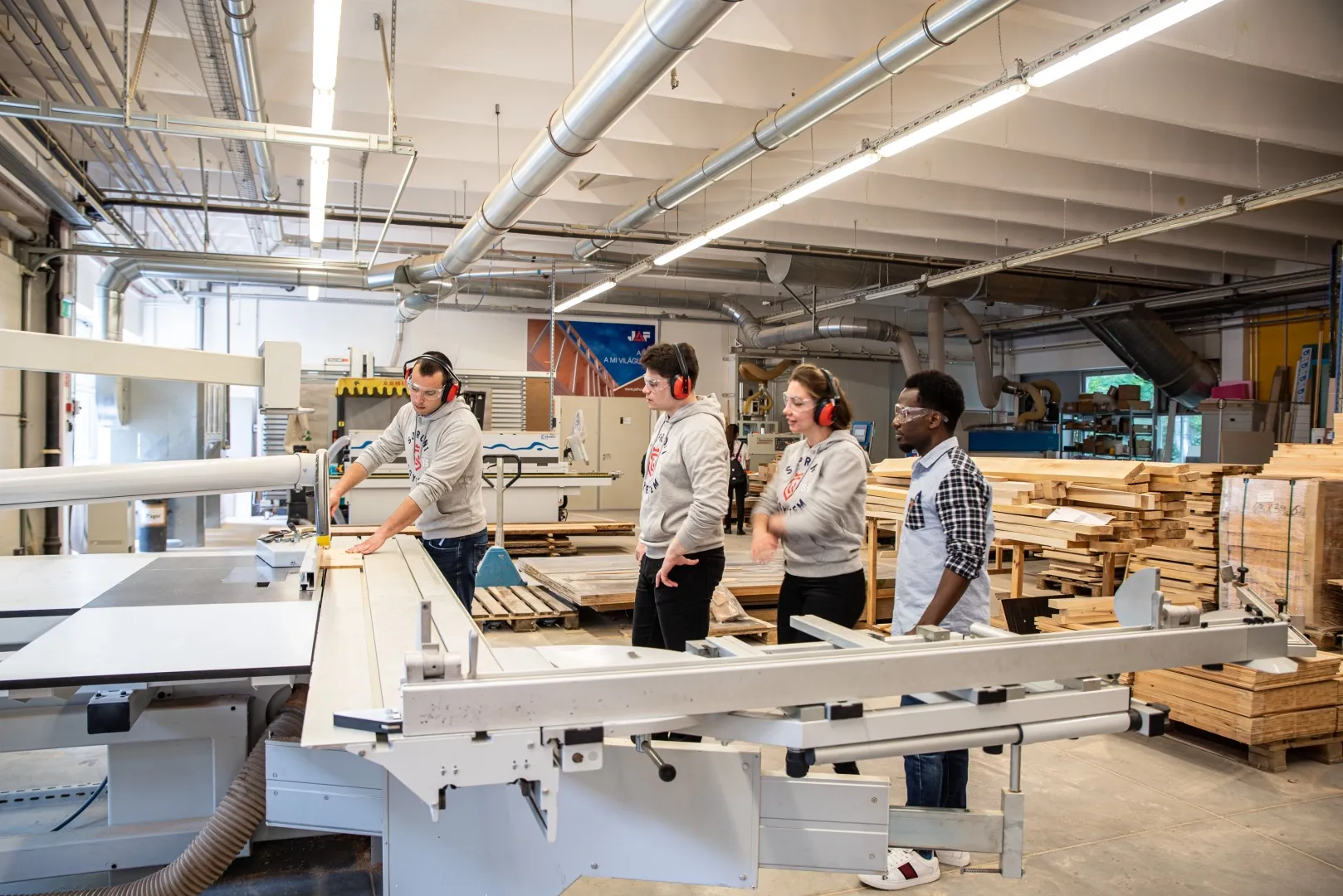(Official name of the study programme: BSc in Timber Industry Engineering)
Innovate, Design, and Lead in Sustainable Timber Engineering.
Programme Overview
The BSc in Timber Industry Engineering at the University of Sopron trains professionals in wood processing, manufacturing, and utilization. This program combines cutting-edge engineering techniques, like computer-aided design and manufacturing, with a deep understanding of sustainable wood utilization. Graduates are equipped with the technical expertise and practical skills to thrive in the timber industry while contributing to innovative, eco-friendly solutions in woodworking and construction.
| General information | |
| Duration: | 7 semesters |
| Tuition fee: | 3000 USD / semester |
| Study mode: | full time |
| Intake: | September |
| Application period - self financed: |
From 1 March to...
|
| Application period - Stipendium Hungaricum scholarship: | mid November - mid January |
| Language of Instruction: | English |
| Faculty: | Faculty of Wood Engineering and Creative Industries |
Why Choose This Programme?
This comprehensive program covers all aspects of timber industry engineering, from primary wood processing to advanced design and manufacturing. Key learning outcomes include:
- Mastery of wood processing and utilization techniques.
- Engineering skills in computer-aided design and manufacturing.
- Expertise in wood-based panel production, furniture design, and timber structures.
- A strong foundation for technical positions or further studies at the MSc level.
Main Subjects and Specializations
The program offers a balanced mix of theoretical knowledge and practical experience (40% theory, 60% practice). Students can specialize in Timber Industry Technology, which provides classical and cutting-edge engineering knowledge tailored to the furniture, building materials, and primary wood industries.
Key Subjects Include:
- Wood Modification Techniques (thermal, acetylation, hygro-thermal methods)
- Wood-Based Panel Production
- Furniture Design and Manufacturing
- Timber Structures and Construction
- Non-Destructive Testing (NDT) of Wood
- Nano Cellulose for Film Materials
- Carbon Fiber Reinforced Wood
Bachelor Thesis Project Opportunities:
- Developing technologies for pencil manufacturing
- Outdoor furniture design and technology
- Surface stability of hardwoods with various finishing materials
- Moisture measurement with NIR spectra
- Advanced wood protection materials and techniques
Career Opportunities
Graduates are highly sought after in the global timber industry, including:
- Primary and secondary wood processing (sawmills, furniture factories, plywood industries)
- Wood construction companies
- Research institutes
- Universities and academic roles
This program provides the skills necessary for leadership roles in the timber industry or for launching your own business.
Competencies Gained
Graduates of the BSc in Timber Industry Engineering program develop a wide range of skills, including:
- Practical application of theoretical knowledge in wood design and engineering.
- Systematic understanding of materials, technology, and products.
- Proficiency in computer-aided design and production management.
- Ability to construct and organize complex projects with environmental responsibility.
Credits Breakdown
- Basic Knowledge of Natural Sciences: 45 credits
- Economic and Human Knowledge: 14 credits
- Professional Core Material: 101 credits
- Optional Subjects: 10 credits
- Specialization Subjects: 40 credits
- Thesis-Related Work: 15 credits
Online Application for BA/BSc Programs
Applicants to the University of Sopron's English-taught BA/BSc programs must provide the following documents:
- Secondary School Certificate: Provide a copy in English or German.
- Passport Copy: Ensure the copy is clear and valid.
- Proof of English Proficiency: Submit one of the following:
- A valid English proficiency certificate at B2 level or higher, such as TOEFL, IELTS, Cambridge English Qualifications (FCE or higher), Oxford Test of English (OTE) or other internationally recognized English tests, or
- Medium of Instruction Certificate (if applicable).
- Note: Native English speakers are exempt from this requirement.
- Application Fee Payment Confirmation: Upload a copy of the payment receipt.
- Optional Documents: Include recommendation letters, motivation letters, or a CV to strengthen your application.
Important: If any document is not in English or German, attach a certified translation.
About the Faculty
The Faculty of Wood Engineering and Creative Industries is one of Central Europe’s leading centers for timber engineering education. With a history dating back to 1735, the Faculty combines centuries of expertise with modern technological advancements.
Key Features of the Faculty:
- Focus on technical, arts, and IT education.
- Award-winning students and faculty recognized nationally and internationally.
- Consistent podium finishes at national wood engineering competitions.
Ready to shape the future of the timber industry? Join the University of Sopron and gain the skills to lead sustainable innovation in wood engineering!
Contact the Faculty of Wood Engineering and Creative Industries:









